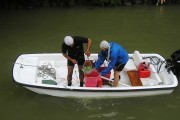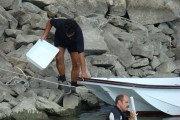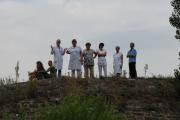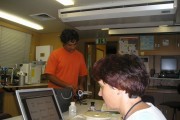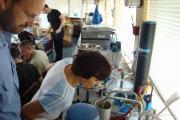
The first problem was Sampling Station 31, the start of the Rackeve-Soroksar Danube Arm -- inaccessible to ships including the Argus because of its low water level. Fortunately, a small boat provided by VITUKI, the nearby (renowned) water research management institute, came to the rescue to help with collecting samples.
Number two - the hydraulic system of the crane lifting the heavy air-lift sediment sampler stopped working, which meant that the team assessing macrozoobenthos (i.e. small organisms living at the river bottom) had to operate the equipment manually.
Three - an interruption to the power supply on-board the Argus caused a temporary breakdown of the pumps delivering regular water samples. River water is continuously pumped through a pipe into the Argus lab for tapping and testing, saving scientists the trouble to get water from on-deck. But if the water stops, equipment such as the radon analyzer can't function. And if the radon analyzer can't function, then information about the connectivity between groundwater and river water also stops. The electrical failure also disabled the Argus's crane that lifts its smaller sampling boat in and out of the water, used by the team to carry out all of its necessary biological investigations along with the small boat from the Szechenyi. So the team was forced to use only the Szechenyi boat -- true, it took longer, but the team refused to give up and collected all of the samples as pre-scheduled.
To complete the disaster story, a cup of coffee was accidentally spilled on the laptop of Austrian microbiologist Alexander Kirchner, effectively killing its hard disk. Fortunately, the microbiological data was recovered from a backup and uploaded to the JDS2 website as required.
By the time the ships reached the port of Dunaujvaros at day's end, everybody was exhausted. Three stations (31, 32 and 33) had been sampled. And eventually, and amazingly, all of the ill equipment (except the crane for the Argus's small boat) had been brought back to order, thanks mainly to the efforts of Serbia's Tomislav Andjic - an indispensable member of the Argus crew for such crisis situations. Hungary's National Team of scientists helped overcome many of the difficulties. The evening also included the task of getting the latest chilled samples from the ships to land and car for transport to the JDS2 Reference Laboratories.
What a day!













